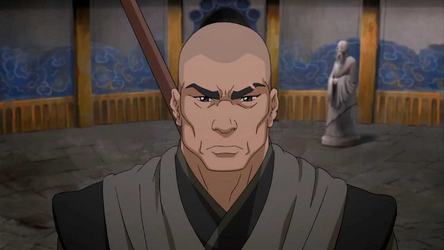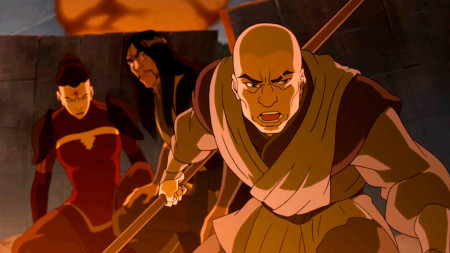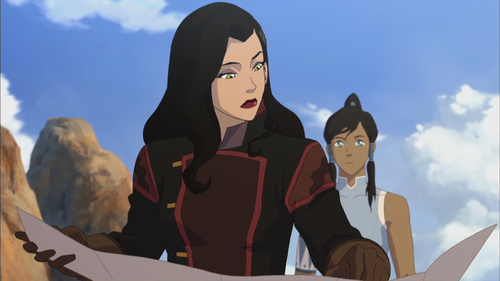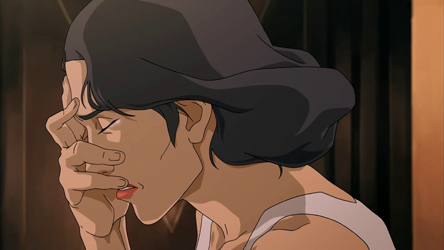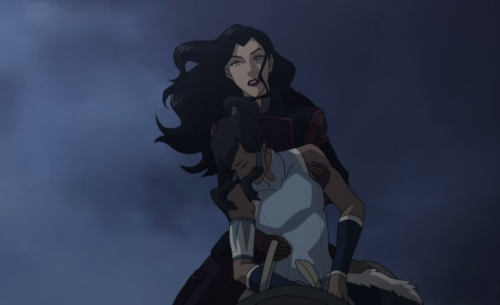The Legend of Korra, Nick’s popular animated series, has been going through a tumultuous period as of late. After being pulled off the air due to low ratings, it appears to be heading to a digital only format. While Nickelodeon’s lack of promotion for the third season certainly added to the low viewership (the trailer for Book 3: Change was only released one week prior to the first few episodes airing), there has been much grumbling among fans and even casual viewers of the program about how disappointing the previous season of Korra was.
Whether the quality of Book 2: Spirits added to the show’s low viewership for 2014 is hard to say. Still, it’s especially sad since Season 3 was working so hard to deliver some impressive storytelling and character development. I think I’ve made it pretty clear in my past comments on OneOfUs.net that I wasn’t exactly a fan of the previous season of Korra. However, I and many others were taken-a-back by the numerous improvements during this most recent season. In an effort to show my love for the show (and my dissatisfaction with Season 2), you’ll find a list of reasons why The Legend of Korra succeeded in delivering some of the best programming you’ll see this year.
Some spoilers for The Legend of Korra below.
A Complicated Villain
While I think Amon still reigns supreme as the best villain to be featured in the entire Avatar series, Season 3’s Zaheer (Henry Rollins) is a close second to the gravelly voiced blood bender. Seemingly able to be passionate and cold all at the same time, Zaheer’s philosophical nature makes him both understandable and strangely sympathetic. As the leader of the Red Lotus, an organization that embraces the idea of disorder being the natural order, Zaheer believes it is his mission to show the world that its leaders prey on the weak and helpless.
Branded a terrorist and imprisoned at the hands of Fire Lord Zuko and Southern Water Tribe Chief Sokka, Zaheer spent years reciting the ancient proverbs of Guru Lahima, an air bending philosopher who lived 4,000 years ago. After Korra unlocked the portals connecting the spirit world and physical world, Zaheer learned he possessed air bending. Unlike Season 2’s painfully uninteresting Unalaq and his partner in crime, a red kite, Zaheer’s motivations go beyond just being evil for the sake of being evil. He has a point of view that’s actually logical. His methods might be extreme and even cruel, but he adds another layer of complexity to an animated series that prides itself on addressing adult themes.
Asami Sato
Arguably the strongest female character on the show, Asami Sato’s introduction was originally met with skepticism. Thought at first to be just a rich girl with a pretty face, Asami quickly proved that she was not only an extremely resourceful and intelligent young woman, but a person that played an intregal part in Team Avatar’s adventures. Sadly, it was not only disappointing to see Asami relegated to be a bit-player in Spirits, but it was also horrifying to learn that her entire arc during the season was to be a wedge in the painfully dull Korra-Mako relationship. Building strong female characters, something that the Avatar series accomplished so astoundingly well in dozens of episodes, was abandoned for shipping wars. In this last season, it was obvious the writers were making up for the severe lack of Asami, and gave her more than enough to do.
Acting as Korra’s closest confidant, a position that Tenzin often occupied in earlier seasons, Asami would offer Korra advice and even be instrumental in aiding the young Avatar’s struggles in the Earth Kingdom capital of Ba-Sing-Se, and numerous battles against the Red Lotus. Plus, she jumped over a motorcycle and took out the driver with one hit. That’s pretty damn impressive.
Lin Bei-Fong
Lin Bei-Fong, one of the standout characters from the first season, was all but ignored in Korra’s lackluster second. Thankfully, Book 3 not only brought the metal bending master back as a strong supporting character, but it also explored her relationship with her estranged half-sister, Suiyn, and seemingly aloof mother, Toph. Viewers learned that’s Toph’s hands-off approach to parenting may have been the cause for not only Lin’s stubborn attitude, but the starting point for her resentment and outright hatred for her sister. With two episodes dedicated to Lin’s past, it was revealed that the often cold and hardened policewoman of Republic City suffered from depression and crippling loneliness. Depression has been something briefly explored perhaps only with Zuko in the original series, but Lin’s story tackled it head on with grace.
Believable Relationships
A major point of contention among Avatar fans was the ridiculous focus on the Korra-Mako relationship during Season 2. Thankfully, Season 3 sought to strengthen the friendships between all the members of Team Avatar. The one relationship that has seen the most growth has been Korra and Asmai’s. Initially set-up as rivals in past episodes, Korra and Asami would spend the majority of Season 3 together. Whether it be clearing the air over what happened between them in the past, or escaping man-eating sand sharks, their friendship truly blossomed during their travels together. Their final interaction during the last episode was especially heartwarming.
Korra’s Maturity
One of the biggest complaints of Season 2 was how little Korra seemed to mature as a character after the death of Amon and the end of the Equalist movement. Her arrogance and brashness made sense in Season 1. She was young and was forced to live a sheltered life under the ever watchful eye of the White Lotus. It made sense then, but her continued immaturity throughout Season 2 puzzled and exasperated fans to no end. Whether it was the way she so often verbally disrespected her parents and Tenzin, or even the way she paid little thought to the feelings of her closest friends, Korra’s evolution as a character seemed to stop abruptly. Thankfully, Korra’s humility and empathy seemed to kick into high gear. From the earliest moments of the first episode, where she comforted a man on the edge of suicide, to her willingness to sacrifice herself for the lives of a nation reborn, Korra truly became an Avatar both physically and mentally by the last few episodes of Season 3.
Do you think Korra’s third season was an improvement over its second? Do you think Season 2 had any problems? What are your predictions for the show moving forward? Let us know in the comments below.
 If you have a few extra dimes to spare, please help us help a fan in need. Thank you!
If you have a few extra dimes to spare, please help us help a fan in need. Thank you!



